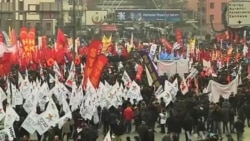LONDON —
Turkey’s prime minister is battling corruption allegations amid a power struggle that goes to the heart of the political elite. Analysts say the feud, which has seen three Cabinet ministers lose their jobs, was triggered by slowdown in a country long seen as a rising economic power in the region.
Rival lawmakers started a brawl in Turkey’s parliament Sunday as the political feud intensified.
They clashed over a draft bill that will give the government a bigger role in appointing judges and prosecutors. The opposition claims it is an effort to stifle a corruption scandal.
Prime Minister Recep Tayyip Erdogan has cast the corruption allegations as an attempted "judicial coup" - and blames foreign powers. Speaking last month, he said propaganda has been launched against the government. There is a gang, a cabal plotting against the state, he said.
Far-reaching allegations
More than 10,000 anti-corruption protesters took to the streets of Ankara last week.
Gul Berna Ozcan of Royal Holloway University of London said the allegations extend to the top of Turkish business and politics.
“Corruption has actually been increasing as the economy got bigger and more affluent," said Ozcan. "The most critical part of the current government’s corruption index so to speak has to do with public procurements, municipal services, land planning, urban planning and privatization, in particular of former state assets.”
The scandal has seen three Cabinet ministers resign. Several police chiefs and 350 police officers have been fired. Dozens have been arrested.
Observers say the purge is targeting followers of a powerful conservative movement known as Hizmet, founded by a U.S.-based Islamic scholar, Fethullah Gulen.
“The Gulen movement, which is a form of solidarity platform, has also been part of this economic reallocation. Reallocation through privatization, municipal real estate arrangements… And they perhaps have been increasingly squeezed out of these big fortunes,” said Ozcan.
Faltering economy
An average economic growth rate of 5.2% per year during the last decade has helped Erdogan win three terms in office. But since 2011, that growth has begun to falter, said Fadi Hakura, Turkey analyst at policy institute Chatham House.
“Now that the pie is shrinking, each side wants to have a bigger slice of a shrinking pie, and that’s generating an enormous amount of feuding and disagreement between conservative forces in Turkey,” said Hakura.
Hakura said Turkey has become stuck in what economists call a middle-income trap. “What is important is productivity growth, the quality of human capital, robust state institutions, transparency and the rule of law. And on all these criteria, Turkey is seriously lacking."
And the latest corruption allegations spell further economic trouble, said Ozcan. “The rule of law is definitely in serious danger. No one would like to invest in a country where the judiciary is controlled by the government.”
Erdogan claims the allegations are false and aimed at derailing his bid to become president in elections scheduled for September.
Rival lawmakers started a brawl in Turkey’s parliament Sunday as the political feud intensified.
They clashed over a draft bill that will give the government a bigger role in appointing judges and prosecutors. The opposition claims it is an effort to stifle a corruption scandal.
Prime Minister Recep Tayyip Erdogan has cast the corruption allegations as an attempted "judicial coup" - and blames foreign powers. Speaking last month, he said propaganda has been launched against the government. There is a gang, a cabal plotting against the state, he said.
Far-reaching allegations
More than 10,000 anti-corruption protesters took to the streets of Ankara last week.
Gul Berna Ozcan of Royal Holloway University of London said the allegations extend to the top of Turkish business and politics.
“Corruption has actually been increasing as the economy got bigger and more affluent," said Ozcan. "The most critical part of the current government’s corruption index so to speak has to do with public procurements, municipal services, land planning, urban planning and privatization, in particular of former state assets.”
The scandal has seen three Cabinet ministers resign. Several police chiefs and 350 police officers have been fired. Dozens have been arrested.
Observers say the purge is targeting followers of a powerful conservative movement known as Hizmet, founded by a U.S.-based Islamic scholar, Fethullah Gulen.
“The Gulen movement, which is a form of solidarity platform, has also been part of this economic reallocation. Reallocation through privatization, municipal real estate arrangements… And they perhaps have been increasingly squeezed out of these big fortunes,” said Ozcan.
Faltering economy
An average economic growth rate of 5.2% per year during the last decade has helped Erdogan win three terms in office. But since 2011, that growth has begun to falter, said Fadi Hakura, Turkey analyst at policy institute Chatham House.
“Now that the pie is shrinking, each side wants to have a bigger slice of a shrinking pie, and that’s generating an enormous amount of feuding and disagreement between conservative forces in Turkey,” said Hakura.
Hakura said Turkey has become stuck in what economists call a middle-income trap. “What is important is productivity growth, the quality of human capital, robust state institutions, transparency and the rule of law. And on all these criteria, Turkey is seriously lacking."
And the latest corruption allegations spell further economic trouble, said Ozcan. “The rule of law is definitely in serious danger. No one would like to invest in a country where the judiciary is controlled by the government.”
Erdogan claims the allegations are false and aimed at derailing his bid to become president in elections scheduled for September.





